牛津小学英语总复习资料
- 格式:doc
- 大小:82.50 KB
- 文档页数:9
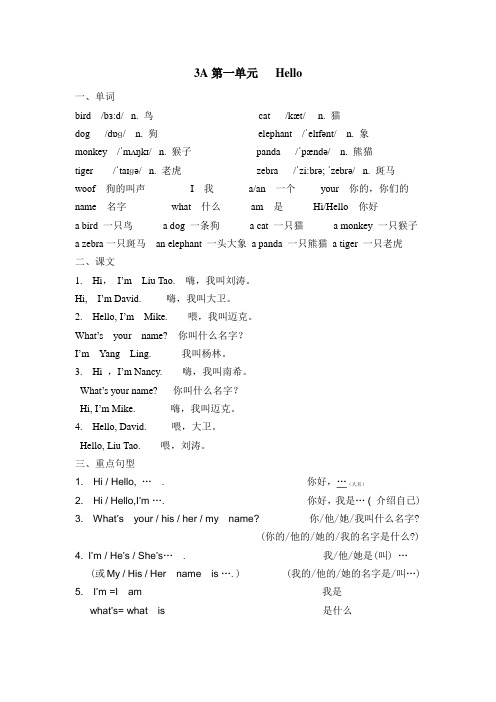
3A第一单元Hello一、单词bird /bɜ:d/ n. 鸟cat /kæt/ n. 猫dog /dɒɡ/ n. 狗elephant /ˈelɪfənt/ n. 象monkey /ˈmʌŋkɪ/ n. 猴子panda /ˈpændə/ n. 熊猫tiger /ˈtaɪɡə/ n. 老虎zebra /ˈzi:brə; ˈzebrə/ n. 斑马woof 狗的叫声I 我a/an 一个your 你的,你们的name 名字what 什么am 是Hi/Hello 你好a bird 一只鸟 a dog 一条狗 a cat 一只猫 a monkey 一只猴子a zebra一只斑马an elephant 一头大象a panda 一只熊猫a tiger 一只老虎二、课文1. Hi,I’m Liu Tao. 嗨,我叫刘涛。
Hi, I’m David. 嗨,我叫大卫。
2. Hello, I’m Mike. 喂,我叫迈克。
What’s your name? 你叫什么名字?I’m Yang Ling. 我叫杨林。
3. Hi ,I’m Nancy. 嗨,我叫南希。
What’s your name? 你叫什么名字?Hi, I’m Mike. 嗨,我叫迈克。
4. Hello, David. 喂,大卫。
Hello, Liu Tao. 喂,刘涛。
三、重点句型1. Hi / Hello,… . 你好,…(人名)2. Hi / Hello,I’m …. 你好,我是… (介绍自已)3. What’s your / his / her / my name? 你/他/她/我叫什么名字? (你的/他的/她的/我的名字是什么?)4.I’m / He’s / She’s… . 我/他/她是(叫) …(或My / His / Her name is ….) (我的/他的/她的名字是/叫…)5. I’m =I am 我是what’s= what is 是什么练习1一.判断下列单词的中文意思,对的打“√”,错的打“×”,并订正。
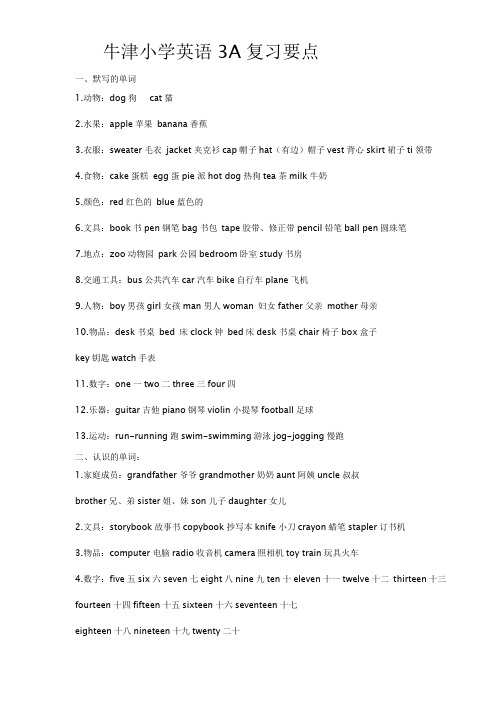
牛津小学英语3A复习要点一、默写的单词1.动物:dog狗cat猫2.水果:apple苹果banana香蕉3.衣服:sweater毛衣jacket夹克衫cap帽子hat(有边)帽子vest背心skirt裙子ti领带4.食物:cake蛋糕egg蛋pie派hot dog热狗tea茶milk牛奶5.颜色:red红色的blue蓝色的6.文具:book书pen钢笔bag书包tape胶带、修正带pencil铅笔ball pen圆珠笔7.地点:zoo动物园park公园bedroom卧室study书房8.交通工具:bus公共汽车car汽车bike自行车plane飞机9.人物:boy男孩girl女孩man男人woman 妇女father父亲mother母亲10.物品:desk书桌bed 床clock钟bed床desk书桌chair椅子box盒子key钥匙watch手表11.数字:one一two二three三four四12.乐器:guitar吉他piano钢琴violin小提琴football足球13.运动:run-running跑swim-swimming游泳jog-jogging慢跑二、认识的单词:1.家庭成员:grandfather爷爷grandmother奶奶aunt阿姨uncle叔叔brother兄、弟sister姐、妹son儿子daughter女儿2.文具:storybook故事书copybook抄写本knife小刀crayon蜡笔stapler订书机3.物品:computer电脑radio收音机camera照相机toy train玩具火车4.数字:five五six六seven七eight八nine九ten十eleven十一twelve十二thirteen十三fourteen十四fifteen十五sixteen十六seventeen十七eighteen十八nineteen十九twenty二十twenty-one二十一twenty-two二十二thirty三十forty四十fifty五十sixty六十seventy七十eighty八十ninety九十ninety-nine九十九5.地点:a dining-room餐厅a kitchen厨房a bathroom卫生间a sitting-room客厅6.食物:a sandwich三明治some bread一些面包some rice一些米饭soft drinks软饮料a bar of chocolate一块巧克力a carton of milk一盒牛奶7.衣服:a belt皮带shoes鞋子trousers裤子socks袜子8.球类:volleyball排球baseball棒球basketball篮球9.乐器:an accordion手风琴10.运动:climb-go climbing爬山skate-go skating滑冰ski-go skiing滑雪rowing划船fishing钓鱼三、词组e here过来2.in the book在书里3.on the desk在书桌上4.in the desk在书桌里5.on the chair在椅子上6.in my pencil box在我的铅笔盒里7.on your English book在你的英语书上8.in your school bag在你的书包里9.this knife这把小刀10.that stapler那个订书机11.in English用英语e in进来13.a nice telephone一个漂亮的电话15.have a look看一看16.my family photo我的家庭照片17.I think我想18.go to school去上学19.get up起床20.have lunch吃午饭21.go home回家22.watch TV看电视23.go to bed去睡觉24.go to the zoo去动物园25.go to the cinema去电影院26.go to the supermarket去超市27.go to the park去公园28.go to the Great Wall去长城29.ten plus five十加五30.seven plus thirteen七加十三31.twenty minus twelve二十减十二32.eighteen minus four十八减四33.how many 多少34.in the kitchen在厨房35.in the dining-room在餐厅36.how much多少钱37.play the violin拉小提琴38.play the piano弹钢琴39.play the guitar弹吉他40.play the accordion拉手风琴41.play football踢足球42.play basketball打篮球43.play baseball打棒球44.play volleyball打排球四、句型1.----Come here,please.----All right. 请过来。

牛津小学英语总复习资料一、大写字母的运用1.句首第一个字母大写。
2.人名、国名、节日名、语言名、组织名等专有名词的首字母大写。
3.星期、月份的首字母大写。
4.特指的学校、政府、党派、委员会或涉及具体人名的称呼或职位,首字母大写。
5.某些特殊词汇、缩略词、标志语、特殊用语等,首字母大写或全大写。
6.句中要强调的部分通常全大写。
7.诗的每一行首字母要大写。
二、与字母发音相同的单词如:Bb-bee, Cc-see/sea, Rr-are, Tt-tea, Ii-I/eye, Oo-oh, Uu-you, Yy-why.三、缩略形式如:I’m = I am, you’re = you are, she’s = she is/she has, won’t=will no t, can’t =can not, isn’t=is not, let's = let us.四、同音异形词如:to/too/two, their/there, right/write, pair/pear, four/for, know/no, sun/son.五、反义词如:day-night, come-go, yes-no, up-down, big-small. short-long\tall,fat-thin,lo w-high, slow-fast,六、名词复数的变化规则1.一般情况下,直接加s,如:book-books, bag-bags, cat-cats, bed-beds.2.以s,x,sh,ch结尾,加es,如:bus-buses, box-boxes, watch-watches.3.以辅音字母加y结尾,变y为i, 再加es,如:family-families, hobby-hobbies.4.以f或fe结尾,变f或fe为v, 再加es,如:thief-thieves, knife-knives.5.以o结尾,加es,如:mango-mangoes.加s,如:radio-radios,photo-photos.6.不规则变化,如:man-men, woman-women, child-children, foot-feet, tooth-teeth.7.不可数名词有:bread, juice, tea, coffee, water, rice等。
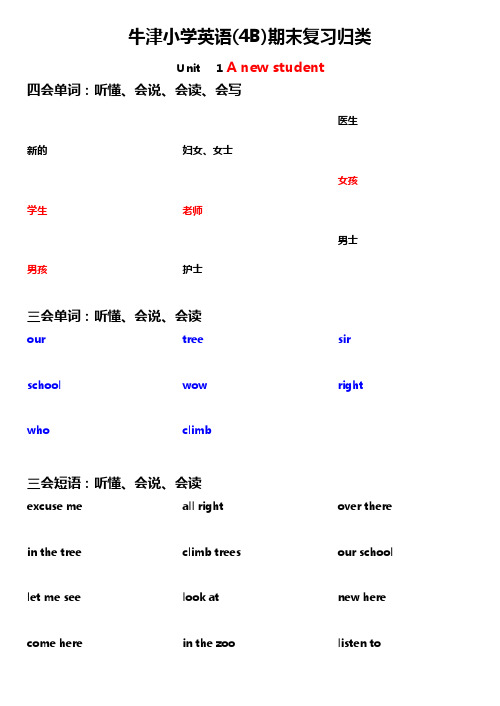
牛津小学英语(4B)期末复习归类Unit 1 A new student四会单词:听懂、会说、会读、会写新的学生男孩妇女、女士老师护士医生女孩男士三会单词:听懂、会说、会读our school who treewowclimbsirright三会短语:听懂、会说、会读excuse me in the tree let me see come here all rightclimb treeslook atin the zooover thereour schoolnew herelisten to掌握缩略形式和其完整形式who'syou'rehe's she'sI'mdon't四会句型:听懂、会说、会读、会写1. A:那个……是谁?B:他/她是……他/她是一名……2. A:你是……吗?B:是的,我是。
/不,我不是。
我是一名……三会句型:听懂、会说、会读1. Welcome to our shool.2. Who’s that boy in the tree?e down, …4.All right.5.Don’t climb trees again.6.Yes, sir.7. Im new here.语音/w/ woman Walkman what which /z/ zebra zoo zero nose dollsUnit 2 At a party四会单词:听懂、会说、会读、会写兄弟姐妹爷爷祖父白色朋友奶奶祖母父亲母亲三会单词:听懂、会说、会读partywith eye which in hairheadearnosemoutho’clockwehurrywrong三会短语:听懂、会说、会读be late forat a party with big eyesin the white skirtin the caron the chair 四会句型:听懂、会说、会读、会写1.他/她是……2、那个……是你的……吗?3、穿着……的那一个.三会句型:听懂、会说、会读1. Good evening.2. Who’s the boy with big eyes?3. Which one?4. The one in the white skirt.5. This is my frient, Mike.6. Nice to meet you.7. We’re late for the party.8. where’s your brother?语音ck/k/ black clock jacket sockUnit 3 What’s your job? 四会单词:听懂、会说、会读、会写男服务员女服务员司机警察女警察工人炊事员农民,农场主三会单词:听懂、会说、会读job name their todayoldaboutwanttobe三会短语:听懂、会说、会读your job my friend in the red sweater in the tree四会句型:听懂、会说、会读、会写1.你的/他的/她的职业是什么?我/他/她是……2.他们的职业是什么?他们是……3.你/他/她多大了?我/他/她……岁。
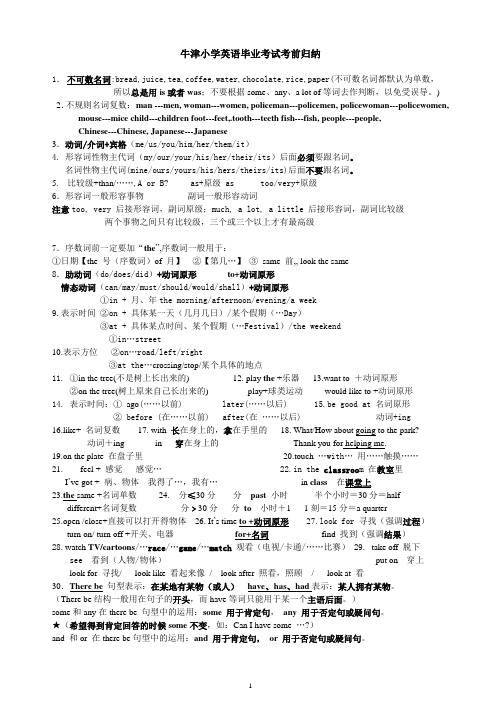
牛津小学英语毕业考试考前归纳1.不可数名词:bread,juice,tea,coffee,water,chocolate,rice,paper(不可数名词都默认为单数,所以总是用is或者was;不要根据some、any、a lot of等词去作判断,以免受误导。
) 2.不规则名词复数:man ---men, woman---women, policeman---policemen, policewoman---policewomen, mouse---mice child---children foot---feet,.tooth---teeth fish---fish, people---people,Chinese---Chinese, Japanese---Japanese3.动词/介词+宾格(me/us/you/him/her/them/it)4. 形容词性物主代词(my/our/your/his/her/their/its)后面必须要跟名词。
名词性物主代词(mine/ours/yours/his/hers/theirs/its)后面不要跟名词。
5. 比较级+than/……,A or B? as+原级 as too/very+原级6.形容词一般形容事物副词一般形容动词注意too, very 后接形容词,副词原级;much, a lot, a little 后接形容词,副词比较级两个事物之间只有比较级,三个或三个以上才有最高级7.序数词前一定要加“the”,序数词一般用于:①日期【the 号(序数词)of 月】②【第几…】③same 前,, look the same8.助动词(do/does/did)+动词原形to+动词原形情态动词(can/may/must/should/would/shall)+动词原形①in + 月、年the morning/afternoon/evening/a week9.表示时间②on + 具体某一天(几月几日)/某个假期(…Day)③at + 具体某点时间、某个假期(…Festival)/the weekend①in…street10.表示方位②on…road/left/right③at the…crossing/stop/某个具体的地点11. ①in the tree(不是树上长出来的) 12. play the +乐器13.want to +动词原形②on the tree(树上原来自己长出来的) play+球类运动would like to +动词原形14.表示时间:①ago(……以前) later(……以后) 15.be good at 名词原形② before (在……以前) after(在……以后) 动词+ing16.like+ 名词复数17. with长在身上的,拿在手里的18. What/How about going to the park?动词+ing in 穿在身上的Thank you for helping me.19.on the plate 在盘子里20.touch…with…用……触摸……21. feel + 感觉感觉… 22.in the classroo m 在教室里I’ve got + 病、物体我得了…,我有…in class在课堂上23.the same +名词单数24. 分≤30分分past小时半个小时=30分=halfdifferent+名词复数分﹥30分分to 小时+1 1刻=15分=a quarter25.open /close+直接可以打开得物体26. It’s time to +动词原形27. look for 寻找(强调过程)turn on/ turn off +开关、电器for+名词find 找到(强调结果)28.watch TV/cartoons/…race/…game/…match观看(电视/卡通/……比赛) 29. take off 脱下see 看到(人物/物体)put on 穿上look for 寻找/ look like 看起来像/ look after 照看,照顾/ look at 看30.There be句型表示:在某地有某物(或人)have、has、had表示:某人拥有某物。

Module Usingmyfivesenses一、核心词汇1.颜色词black黑色的blue蓝色的green绿色的red红色的white白色的yellow黄色的orange橙色的2.食物词candy糖果lemon柠檬icecream冰淇淋3.味觉形容词sour酸的sweet甜的4.交通工具名词bike自行车bus公共汽车plane飞机ship船car小汽车train火车5.动词hear听见listen听6.玩具名词ball球7.疑问词how怎么,怎样8.情态动词can能9.连词and和;同10.其他colour颜色taste味道;尝二、拓展词汇1.颜色词pink粉色的purple紫色的grey灰色的golden金黄色的violet紫罗兰色的2.食物词chocolate巧克力donut甜甜圈mango芒果cherry樱桃pineapple菠萝3.味觉形容词bitter苦的hot辣的salty咸的4.交通工具名词subway地铁taxi出租车raft木筏boat小船jeep吉普truck卡车5.疑问词what什么where哪里who谁whose谁的which哪一个when什么时候why为什么6.情态动词may可能must必须will将要could能够should应该would将要7.连词but但是or或者三、核心句型1.—Whatcolourisyourball?你的球是什么颜色的?—It’sredandwhite.它是红白相间的。
详解:“whatcolour”的意思是“什么颜色”,用来对物品的颜色进行提问。
当主语是单数形式时,be动词用is,答语用“It’s+颜色.”;当主语是复数形式时,be动词用are,答句用“They’re+颜色.”。
举一反三:—Whatcolourisyourpen?你的钢笔是什么颜色的?—It’sblue.它是蓝色的。
—Whatcolouristhepanda?熊猫是什么颜色的?—It’sblackandwhite.它是黑白相间的。
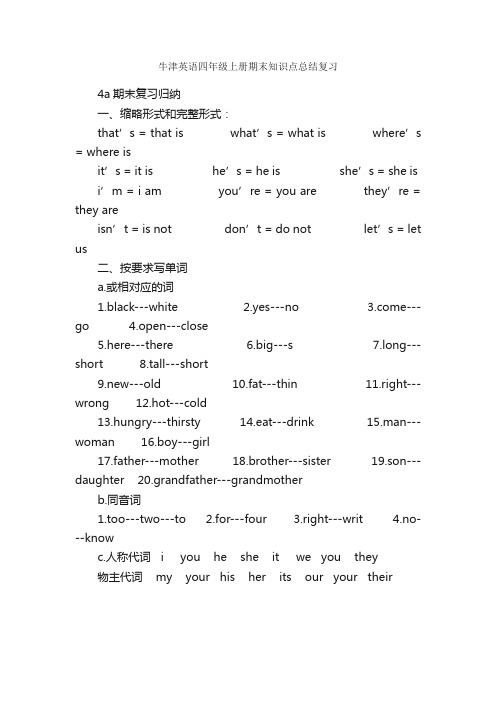
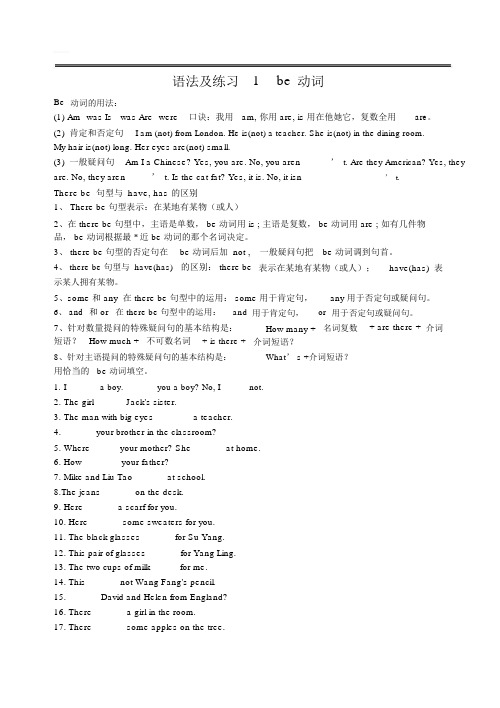
语法及练习 1 be 动词Be 动词的用法:(1) Am--was Is --was Are--were口诀:我用am, 你用 are, is 用在他她它,复数全用are。
(2) 肯定和否定句I am (not) from London. He is(not) a teacher. She is(not) in the dining room.My hair is(not) long. Her eyes are(not) small.(3) 一般疑问句Am I a Chinese? Yes, you are. No, you aren’ t. Are they American? Yes, they are. No, they aren’ t. Is the cat fat? Yes, it is. No, it isn’ t.There be 句型与 have, has 的区别1、 There be 句型表示:在某地有某物(或人)2、在 there be 句型中,主语是单数, be 动词用 is ; 主语是复数, be 动词用 are ; 如有几件物品, be 动词根据最 * 近 be 动词的那个名词决定。
3、 there be 句型的否定句在4、 there be 句型与 have(has) be 动词后加 not ,的区别: there be一般疑问句把be 动词调到句首。
表示在某地有某物(或人);have(has) 表示某人拥有某物。
5、some 和 any 在 there be 句型中的运用: some 用于肯定句,any 用于否定句或疑问句。
6、 and 和 or 在 there be 句型中的运用:and 用于肯定句,or 用于否定句或疑问句。
7、针对数量提问的特殊疑问句的基本结构是:短语?How much +不可数名词+ is there +How many +介词短语?名词复数+ are there + 介词8、针对主语提问的特殊疑问句的基本结构是:用恰当的be 动词填空。
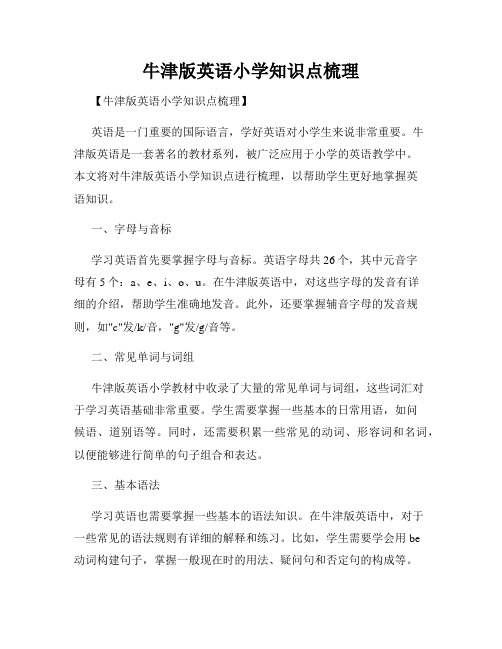
牛津版英语小学知识点梳理【牛津版英语小学知识点梳理】英语是一门重要的国际语言,学好英语对小学生来说非常重要。
牛津版英语是一套著名的教材系列,被广泛应用于小学的英语教学中。
本文将对牛津版英语小学知识点进行梳理,以帮助学生更好地掌握英语知识。
一、字母与音标学习英语首先要掌握字母与音标。
英语字母共26个,其中元音字母有5个:a、e、i、o、u。
在牛津版英语中,对这些字母的发音有详细的介绍,帮助学生准确地发音。
此外,还要掌握辅音字母的发音规则,如"c"发/k/音,"g"发/g/音等。
二、常见单词与词组牛津版英语小学教材中收录了大量的常见单词与词组,这些词汇对于学习英语基础非常重要。
学生需要掌握一些基本的日常用语,如问候语、道别语等。
同时,还需要积累一些常见的动词、形容词和名词,以便能够进行简单的句子组合和表达。
三、基本语法学习英语也需要掌握一些基本的语法知识。
在牛津版英语中,对于一些常见的语法规则有详细的解释和练习。
比如,学生需要学会用be动词构建句子,掌握一般现在时的用法、疑问句和否定句的构成等。
四、日常对话与情境交际牛津版英语小学教材中设置了许多日常对话和情境交际的练习,帮助学生提高口语表达能力。
这些对话和情境交际涉及到日常生活中的各个方面,如购物、问路、问时间等,学生需要通过练习,将这些对话进行模仿和实际运用。
五、阅读与写作阅读与写作是英语学习的重要环节。
牛津版英语小学教材中包含了一些简单的阅读文章,帮助学生培养阅读理解能力。
同时,教材中也有一些写作练习,让学生进行简单的句子和段落的书写,提高写作水平。
六、语法习题与听力训练为了加强对所学知识的巩固和掌握,牛津版英语小学教材中设置了大量的语法习题和听力训练。
学生可以通过这些练习来检验自己的学习效果,同时提高对英语语音的理解和听力能力。
小结:通过对牛津版英语小学知识点的梳理,我们可以更好地了解这套教材中的英语学习内容。

牛津小学英语4A复习知识点词组:(第一单元)1、my ball pen 我的圆珠笔2、her pencil 她的铅笔3、come in 进来4、have a notebook 要一本笔记本5、this pen 这支钢笔6、that ruler 那把尺7、in your pencil case 在你的笔袋里8、all right 好;行;不错9、a big rubber 一块大橡皮 10、for you给你 11、I’ve got我有;我得到12、sure当然 13、a little book一本小书 14、Happy Teachers’ Day! 祝教师节快乐! 15、goodbye 再见;再会(第二单元)1、my tiger 我的老虎2、on the desk 在书桌上3、his cat 他的猫4、have a look 看一看5、a nice monkey一只好看的猴子6、your lion你的狮子 7、a lovely rabbit 一只可爱的兔子 8、your toy bear你的玩具熊 9、I’d like…我想要… 10、in a toy shop在一家玩具店里 11、How lovely! 多么可爱阿! 12、I think 我想;我认为 13、I see 我明白了14、In which box? 在哪只盒子里?15、on the desk 在课桌上 16、can’t =can not 不能;不可以(第三单元)1、over there 在那边2、come here 来这里3、on the book 在书上4、in my purse 在我的钱包里5、your rubber 你的橡皮6、her ruler 她的尺7、in the classroom 在教室里8、an umbrella 一把伞9、Helen’s tape 海伦的修正带 10、Yang Ling’s purse 杨玲的钱包 11、Where’s she? 她在哪里? 12、Where’s he? 他在哪里?13、Let me see. 让我看看。
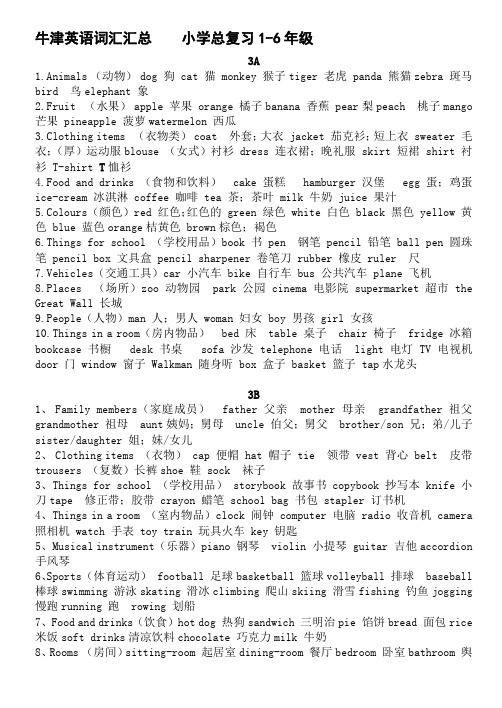
牛津英语词汇汇总小学总复习1-6年级3A1.Animals (动物) dog 狗 cat 猫 monkey 猴子tiger 老虎 panda 熊猫zebra 斑马bird 鸟elephant 象2.Fruit (水果) apple 苹果 orange 橘子banana 香蕉 pear梨peach 桃子mango 芒果 pineapple 菠萝watermelon 西瓜3.Clothing items (衣物类) coat 外套;大衣 jacket 茄克衫;短上衣 sweater 毛衣;(厚)运动服blouse (女式)衬衫 dress 连衣裙;晚礼服 skirt 短裙 shirt 衬衫 T-shirt T恤衫4.Food and drinks (食物和饮料) cake 蛋糕 hamburger 汉堡 egg 蛋;鸡蛋ice-cream 冰淇淋 coffee 咖啡 tea 茶;茶叶 milk 牛奶 juice 果汁5.Colours (颜色) red 红色;红色的 green 绿色 white 白色 black 黑色 yellow 黄色 blue 蓝色orange桔黄色 brown棕色;褐色6.Things for school (学校用品)book 书 pen 钢笔 pencil 铅笔 ball pen 圆珠笔 pencil box 文具盒 pencil sharpener 卷笔刀 rubber 橡皮 ruler 尺7.Vehicles(交通工具)car 小汽车 bike 自行车 bus 公共汽车 plane 飞机8.Places (场所)zoo 动物园 park 公园 cinema 电影院 supermarket 超市 the Great Wall 长城9.People(人物)man 人;男人 woman 妇女 boy 男孩 girl 女孩10.Things in a room(房内物品) bed 床 table 桌子 chair 椅子 fridge 冰箱bookcase 书橱 desk 书桌 sofa 沙发 telephone 电话 light 电灯 TV 电视机door 门 window 窗子 Walkman 随身听 box 盒子 basket 篮子 tap水龙头3B1、Family members(家庭成员) father父亲 mother 母亲 grandfather祖父grandmother 祖母 aunt姨妈;舅母 uncle 伯父;舅父 brother/son 兄;弟/儿子sister/daughter 姐;妹/女儿2、Clothing items (衣物) cap 便帽 hat 帽子 tie 领带 vest 背心 belt 皮带trousers (复数)长裤shoe 鞋 sock 袜子3、Things for school (学校用品) storybook 故事书 copybook 抄写本 knife 小刀tape 修正带;胶带 crayon 蜡笔 school bag 书包 stapler 订书机4、Things in a room (室内物品)clock 闹钟 computer 电脑 radio 收音机 camera 照相机 watch 手表 toy train 玩具火车 key 钥匙5、Musical instrument(乐器)piano 钢琴 violin 小提琴 guitar 吉他accordion 手风琴6、Sports (体育运动) football 足球basketball 篮球volleyball 排球 baseball 棒球swimming 游泳skating 滑冰climbing 爬山skiing 滑雪fishing 钓鱼jogging 慢跑running 跑 rowing 划船7、Food and drinks(饮食)hot dog 热狗sandwich 三明治pie 馅饼bread 面包rice 米饭soft drinks清凉饮料chocolate 巧克力milk 牛奶洗室study 书房kitchen 厨房4Aa pen一支钢笔 a dog一条狗 a key一把钥匙 a ball pen一支圆珠笔 a tiger一支老虎 a purse一个钱包 a pencil一支铅笔 a fan一把扇子 a storybook一本故事书 a book一本书 a cat一只猫 a tape一个修正带 a car 一辆小汽车 a bike 一辆自行车 a kite 一个风筝 a bus一辆公共汽车 a ruler一把尺 a rubber一块橡皮 a pencil case一个铅笔袋 a tiger一只老虎 a panda 一只熊猫 a desk一张课桌 a shop一家商店a pair of shoes 一双鞋子 a sweater 一件毛衣 a jacket 一件茄克衫 big 大的 small 小的 long 长的 short 短的one 一 two 二 three 三 four 四 five 五 six 六 seven七 eight八 nine 九ten 十 eat 吃 drink 喝 write 写 read 读 close 关、闭 open 打开 tired 疲劳的、累的 ill 有病的 cold 冷的 hungry 饥饿的 thirsty渴的4Ba student 一个学生 a teacher 一个老师 a doctor 一个医生a nurse 一个护士 a boy 一个男孩 a girl 一个女孩 a man 一个男人a woman 一个女人 new 新的 grandfather (外)祖父 grandmother (外)祖母 father 父亲 mother 母亲 brother 兄弟sister 姐妹 an eye 一只眼睛 a mouth一张嘴 white白色的 a skirt一条短裙 a friend一个朋友 a policeman一个警察 a policewoman一个女警察 a waiter一个男服务员 a waitress一个女服务员 a driver一个司机a worker一个工人 an engineer 一位工程师 a farmer 一个农民a postman一个邮递员 a cook一个厨师 apples苹果an apple一只苹果 oranges桔子 an orange一只桔子bananas香蕉 a banana一只香蕉 peaches桃子 a peach一只桃子grapes葡萄a grape 一粒葡萄watermelons西瓜a watermelon一个西瓜pears梨 a pear一只梨 some一些a station一个车站a hospital一家医院a supermarket一家超级市场by train坐火车 by plane坐飞机 by taxi坐出租汽车 on foot步行please请chip油炸土豆条 noodle面条 sweet糖果chocolate巧克力 tea茶 coffee咖啡 juice汁液a pie 一个馅饼a chair一张椅子 a blackboard一块黑板 a computer一台计算机a picture一张图画 a bookcase一个书架(橱) an office一个办公室a playground一片操场 a classroom一个教室 our我们的a knife一把刀a plate一个盘子a glass一个玻璃杯a cup一个杯子a bottle 一个瓶子 a table一张桌子 a fridge一只冰箱 an egg一个蛋(不可数名词) bread 面包 rice米;米饭5Aday(一)天;白天 all所有的;全部a reading room一间阅览室 sure有把握的 floor(楼房的)层;地面;地板 a garden一个花园 a house 一间房子 a flower一朵花 live居住;生活 a study一个书房 a bedroom一间卧室 large大的 beside在……旁边;靠近 a wall一面墙 between在……中间;在(两者)之间 a bed一张床 under在……下面behind在……后面 a door一扇门 a lesson 一课a song一首歌 sing唱,唱歌 dance 跳舞 play演奏 learn学,学会 listen听 swim游泳 make 做,制造ride骑(马、自行车) put放,摆 can能 a family一个家庭 things东西、物品 a vase一个花瓶 a horse一只马 a chicken一只鸡 a duck一只鸭子 a pig一只猪 evenings晚上 need 需要 work工作,劳动 a candle 一支蜡烛morning早晨,上午 ring(铃、钟等)响 sweep扫,扫除 Maths数学sleep睡觉 run 跑,奔跑 walk步行,散步 jump 跳跃 say说 chess棋laugh笑,大笑 a newspaper一张报纸 class课,(学校里的)班 perhaps可能a tent一个帐篷 a pot一只锅a towel一条毛巾 a hill 一座小山children孩子们,儿童 fat胖的 thin瘦的show出示,给……看over结束a square 一个正方形 a star一个星形、星形物 us我们(宾格) fly飞、放(风筝、飞机模型等) art艺术、美术 teach教、教书 the moon月亮 paper纸 a heart一个心、心形物 a shape一个形状 a circle一个圆圈 the sun太阳 help…with帮助… wash clothes洗衣服5BMonday 星期一 Tuesday 星期二Wednesday星期三Thursday星期四 Friday星期五a week一星期(周)Chinese 汉语、中文、中国人 Science 科学、自然科学Computer Studies 计算机课程 English 英语、英国的、英国人的a subject 一门学科(科目)interesting 有趣的 a headache 头疼 a cough 咳嗽 a fever 发烧 a cold 伤风lunch 午餐speak 说,讲(同义词:say) bad 坏的、严重的(反义词:good) get 变得、购买feel 感觉、觉得now 现在 a stamp 一张邮票 a coin 一个硬币 a ship 一艘船an animal 一只动物 a classmate 一位同班同学 collect收集beautiful 美丽的、漂亮的hobbies(复数) 业余爱好 collect stamps 收集邮票collect coins 收集硬币go shopping 去购物 take photos 拍照make clothes做衣服an e-mail 一封电子邮件write an e-mail写一封电子邮件a town 一个城镇busy 忙(碌)的age 年龄 usually 通常 well 好fast 快的,快地high 高的,高地run fast 跑得快jump high 跳得高time时间,次 left左 right右 stop停止touch触摸,接触an arm 一只手臂 a hand一只手 a leg一条腿 a foot一只脚a face一张脸 a game一个游戏,一次比赛half半,一半night夜,夜间 on duty值日 past过 a quarter一刻钟,四分之一quick快的(地) ready准备好的 really真正地,确实talk谈话,讲话 spend 度过 weekend周末 very很,非常learn…from…向…学习sport体育运用 often经常,常常of course当然catch抓住,捉住 an ant一只蚂蚁 a bee一只蜜蜂 a butterfly 一只蝴蝶 a visitor一位参观者,一位来访者UK英国,联合王国 visit参观,访问British英国人 the Great Wall长城 USA美国 American美国人Japan日本Japanese 日本人,日语 France法国 French法国人,法语6Astop停止 mean意思是,意指 should应当,应该 must必须,应当 shouldn’t=should not不应当 litter乱丢杂物 park停放(汽车)danger危险 March 三月 April四月 May 五月 June六月 July七月 when什么时候,何时 ago 以前 as 作为,当做 ago 以前 moment瞬间,片刻 a date一个日期 a birthday一个生日 a present 一份礼物 excited激动的,兴奋的 exciting令人激动的,令人兴奋的 a race一次竞赛 plant种植 milk挤;牛奶 a cow 一头母牛 taste品尝 pull up把…向上拔 a festival一个节日 a gate一扇大门answer回答;答复 ask问;请求people 人;人们 last最近刚过去的;最后的 in front of 在…前面 take photos拍照 look for寻找 just now刚才 (a moment ago) pull up把…向上拔 have a good time 过得愉快 Children’s Day儿童节 National Day国庆节 Spring Festival春节New Year’s Day元旦6Bthan 比young年轻的old年老的heavy 重的light 轻的tall高的strong 强壮的low 低 fish鱼,钓鱼 slow慢late晚 stop停车站along沿着street街、街道post office 邮局weather天气spring春季summer夏季hot热的autumn秋季cold冷的winter冬季plan计划,打算 picnic野餐 play(戏剧的)演出be good at善长于 turn left向左转 turn right向右转 post office邮局 get on 上车 get off下车 take part in参加…参与… write a letter写(一封)信 penfriend 笔友also也 glue胶水在家每天读背哦,家长评价______小学英语复习词组a new student 一个新学生a new teacher一个新老师I’m new here. 我是新来的. Welcome to our school. 欢迎到我们学校.excuse me 打扰一下the boy in the tree 树上的那个男孩let me see 让我看看come down 下来climb trees 爬树in the zoo 在动物园里come here 过来the man over there 那边的那个男人good evening 晚上好at a party在聚会上my brother 我的弟弟/哥哥the boy with big eyes大眼睛的那个男孩nice to meet you 见到你很高兴the one in the white skirt 那个穿着白色短裙的which one 哪一个the man with a big mouth那个大嘴巴的男人the one in red那个穿红衣服的the girl with a small nose 那个小鼻子的女孩the woman with long hair那个长头发的妇女be late for school上学迟到the boy with big ears 大耳朵的那个男孩the one in the green shirt 那个穿着绿色衬衫的男人in the car 在小汽车里my good friend我的好朋友her small eye她的小眼睛a big nose一个大鼻子You’re right. 你是对的an old woman 一个老太太buy fruit 买水果some grapes 一些葡萄how many kilos 多少公斤three kilos三公斤I’d like --- 我想要------Here you are. 给你.these apples这些苹果those oranges那些桔子these or those这些还是那些Can I help you?我能为你效劳吗? (营业员用语)by taxi坐出租车on foot 步行go by taxi 坐出租车去go to the theatre去剧院go there 去那儿go to the Great Wall去长城go to the supermarket去超市this train for Shanghai去上海的火车the plane for Beijing 去北京的航班good idea 好主意play football 踢足球in the school 在学校be free 有空 .go to school by bike 骑自行车去学校at a snack bar在一家小吃店(快餐店)里how about---? ------怎么样?some noodles 一些面条Something to drink一些喝的东西something to eat一些吃的东西orange/apple juice 桔汁/苹果汁Anything else? 还要别的东西吗?a cup of coffee/ tea 一杯咖啡/茶a glass of milk/ juice一杯牛奶/果汁some chocolate 一些巧克力some sweets一些糖果some water 一些水play basketball 打篮球some cakes 一些蛋糕get up 起床have some juice 喝点果汁What would you like? 你要什么? open day 接待日our classroom我们的教室watch TV看电视big and bright又大又明亮in your classroom 在你的教室里in class在课上near the window靠近窗some songbooks一些歌本on the piano在钢琴上lots of books许多书in the library在图书馆里in the playground 在操场上On the chair在椅子上on the table在桌上open the blue box 打开蓝色的盒子in the cupboard 在碗柜里on the table在桌上in the fridge在冰箱里on the sofa 在沙发上use chopsticks 用筷子I’d like to try. 我想试试.a pair of chopsticks 一双筷子Let me try again. 让我再试试.in my classroom 在我的教室里Good idea!好主意!the first day of the new term 新学期的第一天all the students 所有的学生at school 在学校see each other 互相见面a new building 一座新大楼a lot of 许多I’m not sure. 我不确定。
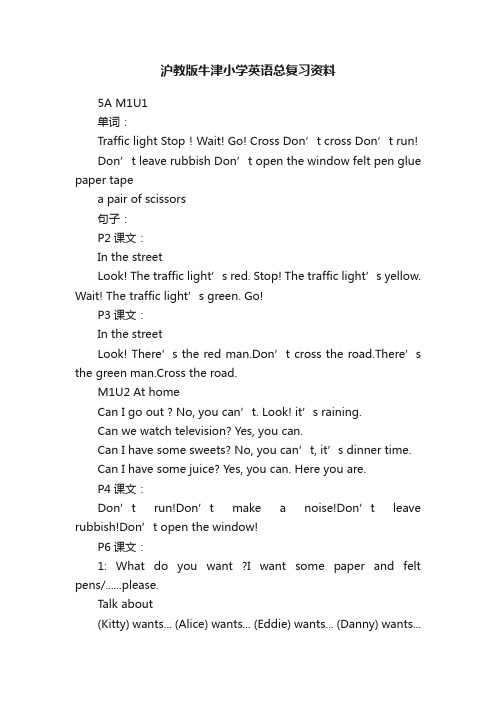
沪教版牛津小学英语总复习资料5A M1U1单词:Traffic light Stop!Wait! Go! Cross Don’t cross Don’t run!Don’t leave rubbish Don’t open the window felt pen glue paper tapea pair of scissors句子:P2课文:In the streetLook! The traffic light’s red. Stop! The traffic light’s yellow. Wait! The traffic light’s green. Go!P3课文:In the streetLook! There’s the red man.Don’t cross the road.There’s the green man.Cross the road.M1U2 At homeCan I go out ? No, you ca n’t. Look! it’s raining.Can we watch television? Yes, you can.Can I have some sweets? No, you can’t, it’s dinner time.Can I have some juice? Yes, you can. Here you are.P4课文:Don’t run!Don’t make a noise!Don’t leave rubbish!Don’t open the window!P6课文:1: What do you want ?I want some paper and felt pens/......please.Talk about(Kitty) wants... (Alice) wants... (Eddie) wants... (Danny) wants...单词:felt pen glue paper tape a pair of scissorsM1U3What do you need ( for school)? I need (a new uniform). /……I need some new shoes.What have we got? We’ve got some papers /……(glue ),but we need some flour/……(milk)单词: Sugar butter flour eggs milk salt jam a bowl a spoon M2U1Hi! I’m Ben. I get up at six o’clock. /……I go to school at seven o’clock. /……Ben gets up at six o’clock. /……He goes to school at seven o’clock. /……What time do you get up?At seven o’clock in the evening. /……M 2U 2 what do you like? Unit3 A birthday party单词:sausages(香肠) carrots(胡萝卜) cabbage(白菜)句型练习:What do you like? What don’t you like? I like……,but I don’t like……He/She likes……,but she /he doesn’t like……Is Kitty hungry or full? Kitty is hungry.Is Peter sick or happy? Peter is sick today.Do you want a sandwiches? A sandwich, please. I like sandwiches.Which bicycle do you like? The……颜色one.When ’s your birthday?My birthday’s on the…日of….月Module 3 Unit 1 My schoolI go to school by school bus.Kitty goes to school by school bus/by car/by taxi/by underground/by tram/on foot.I walk. Betty walks to school.How many floors are there in your school?How many classrooms are there in your school?How many children are there in your school?How many girls/boys are there in your class?How many desks/chairs/fans/windows/blackboards/cupboards/doors are there in your classroom?There are …Un i t 2 Let’s go shopping!I want a ... This one’s...That one’s...How much money have you got? I‘ve got...yuan.How much is that...? It’s...yuan.Unit 3 Follow the signs!Don’t run! 禁止跑步Don’t jump in to the pool! 禁止跳进池子Don’t play ball games! 禁止玩球类游戏Don’t eat!禁止吃东西M4 U1In the jungle I can swim/… Can a monkey swim/… ? Yes , it can./ No, it can’t . Crocodile zoo-keeperM4Unit2 ButterfiesWhat’s this/that?It’s a cocoon.How do you spell that in English? C-o-c-o-o-n.Which one do you like?I like the green and blue one, but I don’t like the black and purple one.单词:cocoon spell lay become caterpillarM4U3Can we see the dolphins?Yes, let’s go to the Ocean Theatre. We can see the dalphinsthere.Can we see the fish? Yes. Let’s go to the Fish Aquarium. We can see the fish there.That’s the Li River. It’s in Guilin.That’s Sanya. It’s on Hainan lsland.单词:Aquarium Restaurant Pool Theatre House map place dolphin seal island tower5B Module1 Unit 1 Use your eyes!Behind the mountain in the morning block’s shadow behind the blockIn the shy in the afternoon beside the block goes down in the eveningIn front of the blockI can’t see …… where is it? It’s/they’re behind/inside …Have you got any…? Yes,I’ve got some… I can’t see. Where are they?They’re…the…Inside the box outside the box behind in front of besideM1 Unit 2 Use your ears!Do you want both …,…? No,the …one,please.Long/short round/square full/empty big/small red/green biscuits pencils Ice-creams bottles cakesM1 Unit 3 Use your hands!Whose pencil case is this?it s mine.Whose bags are these?They re ours.M1 Unit 4 Use your five senses!I listen and hear with my ears. I smell with my nose. I look and see with my eyes.I touch and feel with my hands. I taste with my tongue.He/she can… .Are they the same or different?They’ re same /different.M2 Unit 1 Animals in the zooWhat time do you feed the elephants? I feed them at half past eight in the morning.What do the elephants eat? They eat hay.How much hay do they eat? They eat 50 kilos of hay.When do you clean their cage? I clean their cage at half past six in the morning. Where are the tigers? Go down the steps. Cross the small road.Walk up the steps. Walk along zoo road.Cross park road. The tigers are on the left.单词Left right up down along elephants tigers monkeys giraffes lions plant houses birds parrotsAt the top of the houseM2 Unit 2 Favourite toysWhich…do you like? I like both / all the...Pandas dinosaurs kites bicycles cars bears soldiers robots computers(用于造句)What colour are the…? Both/All the … are…the cars the balls the kites the robots the toy soldiers thebicycles(用于造句)Module2 Unit 3 At homeWhere’s Sam? He was here at ten o’clock. He was here at ha lf past ten. 单词:lamp 台灯shelf 架子mirror镜子picture 图片sofa 沙发Module 3 Unit 1whose bird is this?No,it’s not mine. Mine is black.Is it Grandpa Cai’s? No,it’s not his.His is blue.Is it Mrs Chen’s? No,it’s not hers.Hers is yellow.Is it Mr and Mrs Wang’s? No,it’s not theirs.Theirs is green.Is it yours,Mr and Mrs Li? No,it’s not ours.Ours is brow n.It’s Mr Tang’s.Is it yours,Mr Tang? Yes,it’s mine.The sea was green. Now it’s blue.The a pples were green. Now they’re red.Module 3 Things around us Unit 2It is five past one. It is ten past one. It is twenty past one. It is twenty-five past one.It is twenty-five to two. It is twenty to two. It is ten to two. It is five to two. What time is it? It’s five past one. What time is it? It’s…注意时间的表达,半点或半点以前用past,半点以后用to.Module 3 Unit 3 What is the weather like?What′s the weather like? It’s rainy ... l like the rain and the wind. I don’t like the rain天气类单词:sunny cloudy rainy windy cool dry wet hot cold warm temperature degrees6A M1 U1My name is Alice. These are my family and relatives.This is my grandfather. This is my grandmother. This is my...These are my brothers.How many brothers do you have ? I only have one uncle(家庭成员/I have three(数字).What do you do with your aunt? I usually go shopping with my aunt.What else do you do with her? I sometimes play badminton with her.M1 U2They like to play together.He is always friend.They always walks to school together.He never works hard.Have you been there yet?Yes , I ha ve just been there./No, I haven’t been there.M1 U3What do you usually do at weekends?I usually go shopping in Wangfujing Street.Is wangfujing Street…near or far away from Tiananmen Square…?It’s near/far away from Tiananmen Square.Where have you been (in Beijing)? I have been to Tiananmen Square.How are we going to get there? Let’s go by bus.When are we going to come back? We are going to come back at six o’clock. Which place shall we visit? Let’s go to the Great Wall.How much does it cost? Twenty yuan.How/What about nine o’clock in the morning?Yes, that’s a good time.M2 U1Would you like to be a policeman? Yes , I would./ No, I wouldn’t.Why?/Why not? Because I want to make our city a safe place./don’t like cooking. What would you like to be? I would (‘d) like to be a postman.M2 U2What will they do? They'll visit our classroom.[...]Where will kitty[...] be? She'll be in the library.Where is it? It's on the second[...] floor.M2U3Do you live near or far away from school? I live near\far away from school.How do you go to school? I go to school by bus[...]/on foot.How does kitty[...] go to school? She goes to school by bus/on foot.How long does it take you to get to the park?It takes about twenty minutes. What does he/she see when he/she is on the bus?He/She sees a lot of students when he/she is on the bus.M2U4Don’t turn left.禁止左拐Don ’t walk on the grass. 禁止在草地上走Don’t climb the trees. 禁止爬树Don’t enter. 禁止进入Don’t ru n. 禁止跑Don’t eat or drink. 禁止吃或喝Don’t leave rubbish. 禁止扔垃圾Don’t talk loudly. 禁止大声说话Don’t play ball games.禁止玩球类游戏Where do we have rules? We have rules in the classroom...What does this sign mean? We must listen to our teacher.Where can we find it? We can find it in a library.M3U1How much was it? It was ten yuan.How much were they? They were twenty-five yuan.What would you like for dinner? I’d like some rice. (I’d like noodles.) What kind of soup would yo u like? I’d like chicken soup.Have you bought any prawns? Yes, I have.Where did you buy it? In the supermarket.M3U2Why do you like oranges? Because they are sweet.Why don’t like spicy sausages? Because they’re too spicy.Shall we buy some apple juice? Yes, like/No, l don’t likeapple juice.What would you like? I’d like some bread.Would you like some chicken wings? Yes, please/ No, thanks.May l have some pears, please? OK. Here you are.M3U3How much sugar do we need every day? We need a little sugar every day.What do you usually have for breakfast? I usually have bread and milk.Your diet is healthier than my diet.Your diet less healthy than my diet.Your diet is as healthy as my diet.6B M1U1Look at the map. Beijing is the capital of China. Which city is the capital of Japan? T okyo is the capital of Japan.That’s right. Where is it?It’s north_ east of the shanghai.How far is it from shanghai to Beijing? It’s about 1400 kilometres.How can we travel to Beijing? We can travel by train.How long does it take to travel from Shanghai to Beijing by train? It takes about ten hours.M1 U2What time does your plane leave for Los Angeles tomorrow?At three o’clock in the afternoon/morning/evening.How long does it take to travel to the airport?It takes about one and a half hours.What time should we arrive at the airport?We should arrive at the airport before one o’clock in the morning/afternoon/evening?Don’t worry.M1 U3Do you like rice dumplings?I like salty rice dumpligs with meat,but I don't like sweet rice dumplings with beans.Would you like some rice dumplings. Yes, please. I like rice dumplings. /No, thanks.I don't like rice dumplings. I'd rather have a piece of pizza.What's your favourite indoor activity? I like doing puzzles at home.Why do I always have a headache? It's because you watch too much television. What should I do? You should watch less television.M2 U1This is me in 15 years ’time. I’ll be taller and heavier. I’ll be 165 centimetres tall. I’ll weigh 55 kilograms.I’ll be more beautiful. I’ll be an astronaut.What will Jill be like in 15 years' time? She will be tall and slim.She’ll be 168 centimetres tall./weigh 52 kilograms.What will Jill possibly be in 15 yea rs’ time? She will possibly be a singer/an astronaut .Yes ,I agree./No, I don’t agree.What would you like to be? I would you like to be a doctor.I’m good at Chinese./I’m poor at Maths.I have to practise English and Maths more. I learn how to make sick people better. M2 U2Many students like studying in the library because it is air- conditioned.Not many students playing in the playground because it is hot.Why do many students (not) like studying in the library?playing in the playground?Because it is air-conditioned.it is hot.Boy must wear white shirts with the short sleeves.M2 U3In the past, all passengers had to buy tickets from a bus conductor.there were only single-decker buses.Nowadays ,passengers put their money in a fare box.some buses are double-decker buses.What will travelling in Garden City be like in 10 years` time?Perhaps(all/most/some/none)of the people will travel by(underground /taxi/ plane /bus)Perhaps there will be more underground stations.fewer traffic jams.M3 U1What can you see when there is a gentle wind/a strong wind?I can see people flying kites./clouds moving quickly.What may happen there is a typhoon? A strong wind may break windows.M3 U2If there is no rain, we will have no water to drink./The crops and vegetables will die.What do we use water to do? We use water to brush our teeth.How can we save water? We can save water by fixing a dripping tap./not playing water games.最高级the largest/most intelligent/most dangerous……M3 U3We get wood from trees.What can we use glass to make? We can use glass to make bottles.How does if feel? It’s hard and rough(soft/smooth).W hat is it made of? It’s made of wood.What is it? It’s a wooden box(plastic bag/woolen scarf/cotton T-shirt/glass bottle).疑问词:What what time when how how many how much how old how far how long Which where why人称代词主格:I we you he she it they人称代词宾格:me us you him her it them名词性物主代词Mine yours hers his theirs ours形容词性物主代词My your her his their our职业类单词:job 工作;职业secretary 秘书bank clerk 银行职员policewoman(man) 女(男)警察dentist 牙医driver 司机doctor医生nurse 护士worker工人shop assistant售货员pilot 飞行员fireman 消防员postman邮递员teacher 老师singer歌手cook 厨师astronaut宇航员介词:beside 在…旁边behind 在…后面above 在…上方between 在…之间on 在…上面in在…里under 在…下面near 在…附近in front of 在…前面感觉类单词fluffy smooth shiny rough cold hard warm soft hot颜色类词语:red(红色)orange(橙色)yellow(黄色) green(绿色) blue(蓝色) black(黑色)purple(紫色)white(白色) pink(粉色)brown(棕色)基数词: 11eleven 12 twelve 20 twenty 13 thirteen 30 thirty 14 fourteen 40 forty 15fifteen 50fifty 16sixteen 60sixty 17seventeen 70seventy18eighteen 80 eighty 19 nineteen 90ninety 100 one hundred 序数词:first 第一second 第二third第三fourth 第四fifth第五sixth 第六seventh 第七eighth 第八ninth 第九tenth 第十eleventh第十一twelfth 第十二thirteenth 第十三fourteenth 第十四fifteenth 第十五sixteenth 第十六seventeenth 第十七eighteenth 第十八nineteenth 第十九twentieth 第二十twenty-first第二十一twenty-second第二十二twenty-third第二十三twenty-fourth第二十四twenty-fifth第二十五twenty-sixth第二十六twenty-seventh第二十七twenty-eighth第二十八twenty-ninth第二十九thirtieth 第三十thirty-first 第三十一月份:January一月February二月March三月April四月May 五月June 六月July 七月August八月September九月October十月November十一月December十二月副词总结gently fiercely slightly quickly slowly carefully happily亚洲国家及首都:Asia Japan Thailand China Bangkok Tokyo 方向:North-west north-east south-east south-west重点短语:from …to … ; … of … ; like/enjoy/love doing ; in Beijing… ; plenty of ; a lot of ; lots of ; live in Yangquan… ; in May … ; in 10 years’ time ; in the morning … ; in the playgrou nd ; in the room(…); for six years… ; arrive at … ; at half past six(…) ; on the first of April(具体日期);on that day; on the Earth(oceans) ; jump into ; all/most/some/none o f … ; cut down ; make … ; with…(和…一起;带有…); after that ; on the first/…floor表数量的词组:a few a little lots of a lot of plenty of。

牛津小学英语总复习篇一:牛津小学英语时态复习及专项练习牛津小学英语时态复习及专项练习语法及练习1 be动词Be 动词的用法:(1) Am--was Is --was Are--were 口诀:我用am, 你用are, is用在他她它,复数全用are。
(2) 肯定和否定句 I am (not) from London. He is(not) a teacher. She is(not) in the dining room. My hairis(not) long. Her eyes are(not) small.(3) 一般疑问句 Am I a Chinese? Yes, you are. No, you aren’t. Are they American? Yes, they are. No, they aren’t. Is the cat fat? Yes, it is. No, it isn’t.用恰当的be动词填空。
1. I ______ a boy. ______ you a boy? No, I _____ not.2. The girl______ Jack's sister.3. The dog _______ tall and fat.4. The man with big eyes _______ a teacher.5. ______ your brother in the classroom?.语法及练习2 人称代词和物主代词人称代词和物主代词1.人称代词主格和宾格的区别:主格通常位于句中第一个动词之前(有时候位于than 之后),宾格一般位于动词或介词之后。
2.物主代词形容词性与名词性的区别:形容词性用时后面一般要带上名词,名词性则单独使用,后面不带名词。
一.填写代词表主格。
I it weyou themhis yourhers二.用所给词的适当形式填空。
1. That is not _________ kite. That kite is very small, but _________ is very big. ( I )2. The dress is _________. Give it to _________.( she )3. Is this _________ watch? (you) No, it’s not_________ . ( I )4. _________ is my brother. ________ name is Jack. Look! Those stamps are _________. ( he )5. _________ dresses are red. (we) What colour are_________? ( you )6. Here are many dolls, which one is _________ ?( she )7. I can find my toy, but where’s _________? ( you )8. Show _________ your kite, OK? (they)9. I have a beautiful cat. _________name is Mimi. These cakes are _________. ( it )语法及练习3 名词复数和动词三单一、名词复数规则1.一般情况下,直接加-s,如:book-books, bag-bags,cat-cats, bed-beds2.以s. x. sh. ch结尾,加-es,如:bus-buses, box-boxes, brush-brushes, watch-watches3.以“辅音字母+y”结尾,变y为i, 再加-es,如:family-families, strawberry-strawberries4.以“f或fe”结尾,变f或fe为v, 再加-es,如:knife-knives5.不规则名词复数: man-men, woman-women, policeman-policemen, policewoman-policewomen, mouse-mice child-children foot-feet,.tooth-teeth fish-fish, people-people, Chinese-Chinese, Japanese-Japanese练习:写出下列各词的复数。

牛津英语毕业总复习词汇句型汇总复目:能熟好的。
能使用句型造自己的句子,表达自己的意思。
的名人体部位head,眼睛 eye,鼻子 nose,嘴巴 mouth ,耳 ear,手 hand,胳膊 arm, 腿 leg ,脚 foot,face,身体 body,牙 tooth, hair, 舌 tongue, 手指finger, 肩膀 shoulder,膝盖 knee,脚趾 toe句型1、 I/You/We/They have , It/He/She has ,2、 My/Your/His/Her , is/are big/small.3、I listen and hear with my ears. I smell with my nose. I look and see with my eyes. I touch and feel with my hands. I taste with my tongue.文具笔 pencil ,橡皮 rubber,笔 pen,笔盒 pencil-box/pencil-case ,桌 desk,桌子 table,尺子 ruler,包 bag,book ,黑板 blackboard ,椅子 chair ,paper, 册 exercise book, 写生簿 sketch-book, 蜡笔 crayon, 料 paint, 画笔 brush,毡笔 felt pen, 胶水 glue ,胶 tape,一把剪刀 a pair of scissors句型1、 --What can you see?--I can see ⋯2、 --Is it a , ?--Yes, it is a ⋯ /No, it isn ’t3、Open/Close the book, please.4、 --What is it/this/that? --What are they?--It ’ s a ⋯--They ’ re ⋯5、 --Is this your , ?--Yes, it is/No, it isn ’t6、 --Have you got your , ? wwW .x kB 1.c Om--Yes, I ’ ve got my ⋯ /No, I haven ’ t got my ⋯7、 --Whose , are these/those?--They ’ re ⋯8、 --What do you want? --What does he/she want?--I want some/a ⋯-- He/She wants ⋯9、 --What have we got?--We’ ve got some ⋯ , but we need some ⋯地点: School classroom library office hall toilet playground aviary pond fountain plant house pool country park gym club restaurant cinema market zoo shop temple supermarket airport palace museum railway bus stop garden square station tower police station bathroom bedroom dining room kitchen sitting room bookshop farm plant house street roof cage句型: 1.Is this a/ the ⋯? Yes, it is . No, it ’s the/a ⋯2.What is it? It ’ s a ⋯3.How many ⋯ ? There are.4.Where is the ⋯ ? It ’ s⋯5.What colour is it? It ’ s⋯6.How far is it from ⋯ toIt ’⋯s ?about ⋯.7.How do you go to , ?I go to , by,8.What can you see?9.What time are you going to ⋯ ?食物:apple 苹果jam 果orange 橙子cake 蛋糕banana 香蕉ice-cream 冰激凌pear 梨biscuit 干Coke 可chicken 肉egg 蛋sweet 糖applepie 苹果派sandwich 三明治strawberry 草莓lemon 柠檬pineapple 菠萝water 水crisps 薯片bread 面包coffee 咖啡milk 牛奶Chocolate 巧克力butter 黄油sugar 方糖fruit 水果flour 面粉corn 谷物grass 草hay 干草grapes 葡萄vegetable 蔬菜rice 大米noodles 面条fish 鱼juice 果汁orange juice 橙汁sandwich 三明治sugar 方糖salt 盐chicken 鸡肉sausage香肠hamburger 汉堡包carrot 胡萝卜cabbage 卷心菜potato 土豆tea 茶birthday cake 生日蛋糕durian 榴莲plum 李子cherry 樱桃meat 肉www .Xkb1 .coMsoup 汤tomato 西红柿salad 色拉dumpling 饺子Chicken wings 鸡翅nut 坚果porridge 粥moon cake 月饼rice dumpling 粽子pudding 布丁pizza 披萨食物类句型1. A cake, Ben? Yes,please. Here you are.Thank you.一个蛋糕,本?是的,请。
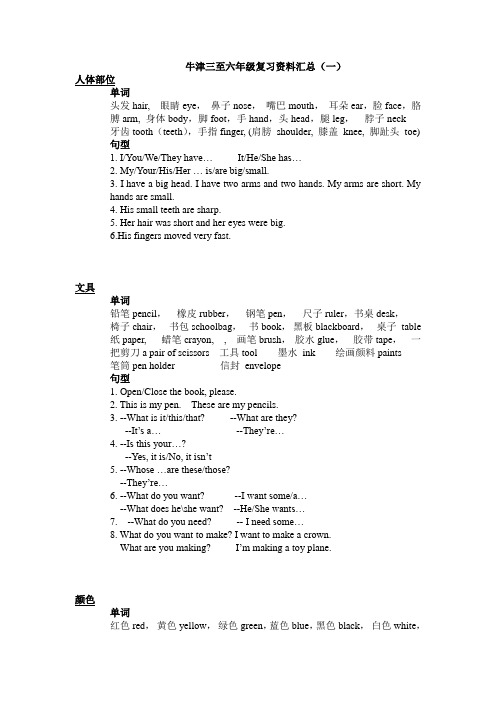
牛津三至六年级复习资料汇总(一)人体部位单词头发hair, 眼睛eye,鼻子nose,嘴巴mouth,耳朵ear,脸face,胳膊arm, 身体body,脚foot,手hand,头head,腿leg,脖子neck牙齿tooth(teeth),手指finger, (肩膀shoulder, 膝盖knee, 脚趾头toe)句型1. I/You/We/They have… It/He/She has…2. My/Your/His/Her … is/are big/small.3. I have a big head. I have two arms and two hands. My arms are short. Myhands are small.4. His small teeth are sharp.5. Her hair was short and her eyes were big.6.His fingers moved very fast.文具单词铅笔pencil,橡皮rubber,钢笔pen,尺子ruler,书桌desk,椅子chair,书包schoolbag,书book,黑板blackboard,桌子table纸paper, 蜡笔crayon, , 画笔brush,胶水glue,胶带tape,一把剪刀a pair of scissors 工具tool 墨水ink 绘画颜料paints笔筒pen holder 信封envelope句型1. Open/Close the book, please.2. This is my pen. These are my pencils.3. --What is it/this/that? --What are they?--It’s a… --They’re…4. --Is this your…?--Yes, it is/No, it isn’t5. --Whose …are these/those?--They’re…6. --What do you want? --I want some/a…--What does he\she want? --He/She wants…7. --What do you need? -- I need some…8. What do you want to make? I want to make a crown.What are you making? I’m making a toy plane.颜色单词红色red,黄色yellow,绿色green,蓝色blue,黑色black,白色white,棕色brown,橘色orange,粉色pink,紫色purple,灰色grey,句型1.--What colour is it? --What colour are they?--It’s… --They’re…2. --Is it…?--Yes, it is./No, it isn’t.3. --Do you like the …on e?--I like the … one, but I don’t like the … one.4. --Which dress do you like, the blue one or the pink one ?-- I like the pink one. Pink is my favourite colour.5. --The … was/were…--Now it’s/they’re…食物单词:apple苹果banana香蕉pear梨orange橙子lemon 柠檬candy 糖果ice-cream冰激凌biscuit饼干bread面包egg鸡蛋juice果汁milk牛奶water水tea茶cake蛋糕noodles面条tomato(复数tomatoes) 西红柿potato(复数potatoes) 土豆carrot胡萝卜fish鱼meat 肉rice大米soup 汤food食物strawberry草莓watermelon 西瓜grape葡萄dumpling 饺子hamburger汉堡包cola 可乐fruit 水果pie馅饼pizza 比萨饼sandwich 三明治vegetable蔬菜chicken 鸡肉Chocolate巧克力fish and chips 炸鱼薯条seafood 海鲜sushi 寿司turkey 火鸡pea 豌豆句型:1. ---How much is it? It’s six yuan.---How much are they? They’re ten yuan.2. Taste it. How is it? It’s sweet. It’s candy. It’s sour. It’s a lemon.3. What do you have for breakfast\ lunch\ dinner?I have some bread and bananas. We have some water and some candy.4. Here’s a birthday cake for you. Here are some noodles for you.5. Smell it. Is it strawberry juice or watermelon juice? It’s watermelonjuice.6. What would you like? I’d like some tomatoes and eggs. We can makesome soup.7. What did you have for breakfast this morning?I had two hamburgers and some cola.8. You can have a little meat but not too much.9. We should have breakfast every day.10. Healthy children eat…They drink …动物:单词:cat猫dog狗mouse(mice) 老鼠rabbit兔子fish鱼bear熊elephant大象lion狮子monkey猴子panda熊猫tiger老虎pig 猪sheep 羊cow 牛horse 马bird鸟animal动物duck 鸭子duckling 小鸭swan 天鹅insect昆虫butterfly 蝴蝶ant 蚂蚁bee 蜜蜂blue whale蓝鲸wild animals 野生动物south China tiger 华南虎owl 猫头鹰rhino 犀牛dinosaur 恐龙句型:1.I like monkeys. Do you like monkeys? Yes, I do. No, I don’t.2. I like elephants. They are big and strong.3. Its ears are long. Its eyes are small. Its tail is short. What is it? It’s a rabbit.4. A cat can run. A bird can fly…..5. These are my horses. They like grass.6. What did you see at the insect museum?I saw ants, bees, butterflies and other insects.7. Animals in danger. In the past, there were many pandas, but now there are only…季节及天气:单词:spring 春天summer 夏天autumn/fall 秋天winter冬天warm暖的hot热的cool凉爽的cold冷的sunny阳光充足的windy有风的cloudy多云的rainy下雨的句型:1.In spring, it is warm. In…, it is…2.How’s the weather? It’s cold and cloudy.3.I don’t like the rain. I can’t play in the park.I like the wind. I can fly my kite.4. The wind is blowing. It is blowing gently. ( strongly)5. What’s your favourite season ? / Which season do you like best?I like winter best.Spring is good, but summer is my favourite season.Why do you like summer? Because I can swim in the lake.Why do you like winter? Because I can make a snowman.人物:单词:boy girl Mr. Mrs. Miss friend mom dad father mother brother sister me uncle aunt cousin classmate parent grandparent grandfather(grandpa) grandmother(grandma) kid baby neighbour son daughter e-friend描述人物形容词:beautiful cute handsome pretty句型:1. Are you a girl? Yes, I am. No, I’m not. Are you Miss Fang? Yes, I am.2. He’s my friend. He’s tall.(strong, short, fat, thin)3. Who is he (she)? He (she) is my father (mother).4. Do you have any cousins? Yes, I have …\ No, I don’t have any cousins.5. This is my uncle. His name is Dan. This is my aunt. Her name is Lily.6. Sally was about two months old. She was small and cute. ( tall and pretty)7. The Whites are my neighbours. They are from the UK. They have a son ( daughter).8. I weigh 47 kilograms. I’m 150 centimeters tall.9.Would you like to have e-friend in other countries? Yes, I’d like to have an e-friend in…10. In 15years, I ’ll be a teacher. I won’t wear glasses. I’ll have big and beautiful eyes.职业:单词:job doctor nurse fireman bus-driver teacher worker pupil farmer pilot cook taxi driver writer artist policeman policewoman student singer writer photographer street cleaner dancer句型:1. What does your mother do? She is a nurse.What does your father do? He is a fireman.2. What do you want to be? I want to be a pilot. I want to fly a plane in the sky.I want to be a doctor. I want to help people.I want to be a teacher. I want to teach English in a school.I want to be a cook. I want to cook nice food.3. Mr Zhang is a photographer. In the past, he used film to take photos. Now he uses adigital camera…….交通:单词:bus bike plane ship car train undergroundtaxi boat truck句型:1. What can you hear? I can hear a/an…...2. What can he/she hear?He/She can hear a/an……3. How do you come to school?I come to school on foot4. I live far from(near) my school. I go to school by …5. She gets off the train at Park Street Station.Then she takes Bus No.12 to Spring Street.6. How long does it take to get to Shanghai from Beijing by train?It takes about five hours.玩具:单词:toy kite robot toy bear ball balloon句型:1.What do you like? I like robots.2.I like this…. It’s lovely. (super\ cool \ fun)3.Is it a toy dog? Yes, it is. \ No, it isn’t.服饰:单词:clothes T-shirt shorts skirt shirt dress trouserssweater coat shoes socks glasses cap scarf句型:1. She has a dress. It’s white and red.2. He has a pair of brown shorts.3. Which dress do you like, the blue one or the pink one?4. Which pair of trousers do you like, the white one or the brown one?5. It’s your size. I’ll try on the trousers. Put …on…Take off.6. Whose socks are these? They’re mine.7. Is this your cap? No, it’s Paul’s.8. Are they yours? No, they aren’t.。

牛津小学英语三年级四年级复习资料(2012新)【完整版】(文档可以直接使用,也可根据实际需要修订后使用,可编辑放心下载)牛津四年级(下)复习资料〔知识归类〕食物类〔food〕cake egg crisp bread biscuit chocolate butter jam sugar sweet apple-pie flour ice-cream sandwich hamburger 饮品类〔drink〕water juice coffee milk Coke水果类〔fruit〕apple banana pear orange lemon pineapple strawberry grape watermelon动物类〔wild animal野生动物、pet〕dog cat hen chick duck duckling rabbit pig horse cow sheep monkey donkey fish bird frog parrot panda snake mouse zebra tiger lion bear elephant spider wolf swan昆虫类〔insect〕bee fly butterfly ladybird moth(蛾) wasp(黄蜂)身体部位〔body〕hair head face eye ear nose mouth tooth(teeth) shoulder arm hand finger body leg knee foot(feet) toe 形状类〔shape〕circle star square triangle rectangle颜色类〔colour〕red yellow green blue white black pink purple orange grey brown violet职业类doctor nurse cook waiter(waitress女效劳员) teacher student worker farmer bus-driver postman fireman policeman(policewoman 女警察) cleaner pilot singer对应词(opposite word):Sad - happy full - hungry sharp -blunt big - small tall - short long - short fat - thin thin - thick beautiful - ugly new – old old – young hot –cold soft- hard rough – smooth black –white sour –sweet warm -cool学习用品类pen pencil ruler rubber bag book crayon exercise-book sketch-book paint pencil-case brush数字类〔number〕one two three four five six seven eight nine ten eleven twelve thir teen four teen fif teen six teen seven teen eigh teen nine teen twenty twenty-one thirty-two forty-three fifty-four季节类(season)spring summer autumn winter动词及其分词类1、直接加-ing: (例watch-watching) look say play sing read watch draw paint jump cook fly dry walk pick climb open2、去–e加-ing : (例write-writing) chase dance drive dive write ride shake make have3、重写尾字母再加-ing: (例run-running) swim run sit dig What are you doing? I’m swimming.What is he doing? He’s sailing his boatWhat is she doing? She’s collecting shells on the beach. What are they doing? They are playing football.月份类〔month〕January February March April May June July August September October November DecemberHow many months are there in a year?(一年有几个月)There are twelve months in a year.(一年有12个月)星期类〔week〕Sunday Monday Tuesday Wednesday Thursday Friday SaturdayThere are seven days in a week.(一星期有七天)What day is it today? It’s Sunday/Monday…服装鞋帽类shirt T-shirt blouse dress shoe(s) scarf hat glove天气特点(weather)cold- hot cool- warm wet- dry windy rainy cloudy sunny What’s the weather like? It’s sunny/cloudy/windy/rainy/hot/cold/..家庭成员(family)grandfather(father’s father and mother’s father) grandmother(father’s mother and mother’s mother) father mother brother sister uncle(father’s brother and mother’s brother)aunt(father’s sister and mother’s sister)cousin(uncle and aunt’s son- 儿子and daughter-女儿)地点类(place)school classroom office library hall playground toilet park zoo farm shop supermarket station bus-stop beach sitting-room bedroom dining-room bathroom kitchen 代词类I you he she it we they〔他们〕my your his her its our their〔他们的〕How are you? I’m fine. We are brave. They are afraid. What’s your name? My name is Lynn.I have a friend. My friend is a boy. His name is Eric.He has a sister. Her name is Wendy. She has two big eyes.This is our classroom. That is their classroom.Look at the donkey. It is big. Its ear are long. Its tail is short.玩具类〔toy〕robot doll kite ball skateboard toy car football basketball puzzle soldier mask交通工具类van bus car train boat ship spaceship bicycle (bike) lorry aeroplane motor-bike植物类〔plant〕grass flower(stalk leaf root) tree(trunk branch leaves roots)短语a bottle of water/ juice/ milka packet of biccuits/ crisps/ sweetsa pair of shoes/ gloves/ glasses/ sunglassesin短语in the classroom in the kitchen in the sitting-room in the dining-room in the bathroom in the bedroom in the park in the plant house in the fountain in the pond in the playground in the aviary in the tree in the shoe shop in the toilet in the sky in the supermarket in the desk in the pencil-caseon 短语on the swing/ slide on the log on the farm on the van on the desk on my /his /her bed on(at) the beach on a leaf on a rock on the moonunder 短语under the tree under the desk under the bed under an umbrella 关于how引导的疑问句及答复How is the weather?It’s sunny/cloudy/windy/rainy/hot/cold/warm/cool/wet/dry.How are you?→I’m fine, thank you.How is your mother? She’s fine.How is your father? He’s fine.How old are you? I’m eleven.How old is Ben? He’s ten.How old is Wendy? She’s fifteen.How much is the bag? It’s twelve yuan.How much are the bananas? They’re eight yuan.How much milk have you got? I’ve got a bottle of milk. How many hoops are there? There are seven hoops. How many teachers are there? There is one teacher. How many bottles of milk have you got?I’ve got five bottles of milk.关于what引导的疑问句及答复What time is it? It’s seven o’clock.What’s the time? It’s half past eleven.What colou r is the sun? It’s yellow.What colour are the leaves? They are green.What shape is it? It’s a square/a rectangle/a star…What is your name? My name is Alice.What is your brother’s name? His name is Ben.What is her name? Her name is Wendy.What can you do? I can sing and dance. What can your father do? He can dive.What can your mother do? She can cook. What can they do? They can draw.What do you do? I’m a teacher/ student. What does y our father do? He’s a policeman. What does your mother do? She’s a doctor. What does your friend do? He’s/ She’s a student. What does his sister do? She’s a nurse.What does her brother do? He’s a driv er. What do you like? I like horses.What does Kitty like? She likes red flowers. What does your father like? He likes to sing.What does his mother like? She likes the white dog. What does her sister like? She likes red.What do horses like? They like hay.What do cows/ sheep like? They like grass.What do pigs/ hens like? They like corn.What do they like? They like English.What have you got? I’ve go t a new skateboard. What has he got? He ‘s got a blue bicycle. What has she got? She has got a pink dress. What has she got? She’s got long hair.What has the plant got? It has got a long stalk. What has the tree got? It has got green leaves.关于whose的疑问句及答复Whose car is it? It’s my father’s car.Whose kite is it? It’s Eric’s kite.Whose balls are they? They are Ben’s balls. Whose bag is it? It’s Grandma’s bag.Whose exercise-books are they? They’re Peter’s. Whose is the cat? It’s my cat.关于who的疑问句及答复Who is the girl? She’s my sister.Who is this boy? It’s Kitty’s brother.关于where引导的疑问句及答复Where is the aeroplane? It’s above the temple.Where is temple? It’s at the top of the mountain.Where is bench? It’s between the tree and the water. Where is the sun? It’s behind the mountain.Where is Kitty’s drum? It’s beside the window.Where are the ducklings? They are near the pond.Where is Danny? He’s in the fountain.Where is Alice? She’s on the slide.Where is the swing? It’s in the playground.Where is the fountain? It’s under the tree.Where are the ducks? They’re in the pond.Where are the birds? They’re in the aviary.祈使句Close the door/ your book. Open the window/ the box.. Clean the blackboard/ the table. Come in, please.Hands up. Clap your hands. Wave your hand. Don’t climb the trees. Don’t walk on the grass.Don’t feed the birds. Don’t pick the flowers.Don’t leave rubbish. Don’t play in the pond.Don’t throw stones. Don’t chase the hens.关于a, an的用法比照an apple→a red apple an aeroplane→a small aeroplanean aviary→a big aviary an elephant→a fat elephantan egg→a white egg an exercise-book→a new exercise-book an ice-cream→a large ice-cream an insec→a small insectan orange→a big orange an office→an old office→a new office an umbrella→an old umbrella→a new umbrella常用的动词短语:do a puzzle玩拼图do 〔my/her/his〕homework写作业read a book看书watch television(TV) 看电视look at the blackboard看黑板listen to the noise听声音drive a car开车drive a bus驾驶公交车ride a horse骑马ride a motor-bike 骑摩托fly an aeroplane驾驶飞机sail a boat驾驶小船write a letter写信wash 〔my/her/his〕face 洗脸wash〔my/her/his〕hands洗手wash toys 洗玩具wash the dishes洗碟子,盘子dry the dishes擦干碟子,盘子go to bed上床睡觉get up 起床play football 踢足球play basketball打篮球play the piano弹钢琴play the violin 拉小提琴play the guitar弹吉他play the drum 打鼓play the triangle敲三角铁play the recorder吹竖笛名词单、复数形式1、通常在名词末尾加- s例book-books ruler-rulers bag-bags2、以-s, -x, -ch, -sh结尾的通常加-es例bus-buses dress-dresses box-boxes fox-foxes watch〔手表〕-watches branch-branches bench-benches sandwich-sandwiches brush-brushes3、以-f , -fe结尾的通常把-f, -fe改为-ves例leaf-leaves wolf-wolves knife-knives(小刀)4、结尾是辅音字母加-y的,把-y改为-ies例fly-flies butterfly-butterflies5、特殊变化的foot-feet tooth-teeth pliceman-plicemen child-children mouse-miceCan/can’t的用法can〔能,会〕can’t(不能,不会)是个表里如一的“人〞,任何人称面前它都不会改变,对待朋友一视同仁,任何动词见到它都不需伪装,原型出场。
牛津小学英语总复习资料牛津小学英语总复习资料一、大写字母的运用1.句首第一个字母大写。
2.人名、国名、节日名、语言名、组织名等专有名词的首字母大写。
3.星期、月份的首字母大写。
4.特指的学校、政府、党派、委员会或涉及具体人名的称呼或职位,首字母大写。
5.某些特殊词汇、缩略词、标志语、特殊用语等,首字母大写或全大写。
6.句中要强调的部分通常全大写。
7.诗的每一行首字母要大写。
二、与字母发音相同的单词如:Bb-bee, Cc-see/sea, Rr-are, Tt-tea, Ii-I/eye, Oo-oh, Uu-you, Yy-why.三、缩略形式如:I’m = I am, you’re = you are, she’s = she is/she has, won’t=will not, can’t =can not, isn’t=is not, let's = let us.四、同音异形词如:to/too/two, their/there, right/write, pair/pear, four/for, know/no, sun/son.五、反义词如:day-night, come-go, yes-no, up-down, big-small.short-long\tall,fat-thin,low-high, slow-fast,六、名词复数的变化规则1.一般情况下,直接加s,如:book-books, bag-bags, cat-cats, bed-beds.2.以s,x,sh,ch结尾,加es,如:bus-buses, box-boxes, watch-watches.3.以辅音字母加y结尾,变y为i, 再加es,如:family-families,hobby-hobbies.4.以f或fe结尾,变f或fe为v, 再加es,如:thief-thieves, knife-knives.5.以o结尾,加es,如:mango-mangoes.加s,如:radio-radios,photo-photos.6.不规则变化,如:man-men, woman-women, child-children, foot-feet, tooth-teeth.7.不可数名词有:bread, juice, tea, coffee, water, rice等。
(不可数名词相对应的be动词是is/was)七、名词所有格表示人或物品所属关系时,就需要使用名词所有格。
名词所有格的构成有以下规则:1.一般情况下,在名词的末尾加’s构成。
如:Tom’s book2.以“-s”结尾的复数名词的所有格,只在其末尾加’。
如:our teachers’ books3.表示几个人共同拥有的东西时,只在最后一个名字上加所有格。
如:Su Hai and Su Yang’s bedroom八、a, an和the的用法1.单词或字母的第一个读音是辅音读音:a book, a peach, a “U”.单词或字母的第一个读音是元音读音:an egg, an hour, an “F”.2.the要注意的:球类前面不加the,乐器前面要加the,序数词前面要加the。
九、人称代词和物主代词人称代词:1.人称代词分为第一、第二、第三人称,且有单复数之分。
2.人称代词的主格在句中做主语,一般用在动词前(疑问句除外)。
3.人称代词的宾格在句中做宾语,多用于动词、介词后。
4.人称代词能代替表示人称的名词。
物主代词:1.表示所有关系的代词叫做物主代词。
2.物主代词分为形容词性物主代词和名词性物主代词。
物主代词也有人称和数的变化。
3.形容词性物主代词起形容词的作用,后面一定要跟名词,表示该名词所代表的事物是属于谁的。
4.名词性物主代词=形容词性物主代词+名词。
如:This is my bag.= This is mine. 熟记人称代词和物主代词的绕口令:我是" I " ,你是“you","he, she, it" 他,她,它"我的“my”,你的"your",他的"his", 她的"her"十、形容词、副词的比较级1.形容词的比较级:用于两者的比较。
(1)基本句式的构成:A(主格)+ be + 形容词的比较级 + than + B(宾格).(2)表示一样的情况时用原级,结构是:as + 原级 + as2.副词的比较级:(1)基本句式的构成:A(主格)+ 动词 + 副词的比较级 + than + B(宾格).(2)表示一样的情况时用原级,结构是:as + 原级 + as3.形容词、副词比较级的变化规则:(1)单音节词末尾加er;(2)单音节词如果以字母e 结尾,加r;(3)重读闭音节词如果末尾只有一个辅音字母,须双写这个字母,再加er;(4)以辅音字母加y结尾,变y为i,再加er;(5)双音节和多音节词的比较级在原级前加more;(6)不规则变化, 如:well-better, much/many-more。
十一、基数词和序数词1.one--first, two--second, three--third, five--fifth, nine--ninth,twelve--twelfth, twenty-twentieth, forty-one--forty-first.序数词前一定要加the。
2.基数词变成序数词的方法:(1)直接在基数词词尾加上th,如:seventh第七,tenth 第十,thirteenth 第十三;(2)以y结尾的基数词,变y为ie,再加上th,如:twentieth 第二十。
(3)不规则变化,如:first 第一, second 第二, third 第三,fifth 第五,eighth 第八,ninth 第九,twelfth 第十二。
(4)基数词“几十几”变为序数词时,表示“几十”的基数词不变,只把表示“几”的基数词变成序数词,如twenty-first 第二十一。
3.序数词的缩略形式是由阿拉伯数字和序数词的最后两个字母构成的,如:1st, 2nd, 3rd, 4th。
十二、be动词(am, is, are)1.口诀:我用am, 你用are, is用在他她它,复数全用are。
2.否定形式:am not(没有缩写形式), is not=isn’t, are not=aren’t。
3.过去式:am/is(was), are(were)。
十三、情态动词(can,must,could,would,may,shall,should)1.情态动词后面用动词原形。
2.其否定形式是在情态动词的后面加not。
十四、助动词(do, does, did)1.do, does用于一般现在时,does用于第三人称单数,其余一律用do。
2.did用于一般过去时。
3.它们的否定形式为:do not=don’t, does not=doesn’t. did not=didn’t.十五、介词in的用法:1.用在某范围或某空间内,如:in the desk2.在一段时间内,如:in the morning3.以,用……方式,如:in Englishin和on的区别:树上长出来的用on,不是树上长出来的则用in。
in, on, at的区别:in, on, at都可以用来放在时间前面,但是in后面一般是morning,afternoon,evening,月份、年份、季节或者指某一段时间内;on用在具体某一天,如:on Sunday morning;at一般用在某个假期期间(不是指具体的某一天),它还可以用在具体的时间,如:at Spring Festival, at five o’clock.小学英语教材中出现的介词有:in, on, from, of, by, about, for, under, behind, after, before, with, near, off, at, to, around, nearby等。
十六、特殊疑问词十七、there be结构与have, has的区别there be结构:1.there be结构表示“某地存在着什么事物或人”。
在一般现在时中,there be结构应该用there is 或there are 表示;在一般过去时中,there be结构则应该用there was或there were表示。
2.主语是不可数名词或单数可数名词时用is(was),是复数时用are(were)。
3.there be结构遵循就近原则。
4.在陈述句中为了强调地点,可将介词短语提到句首。
5.否定句:在be动词后面加not,如果句中有some,要变成any。
6.一般疑问句:把be动词提到句首,首字母大写,句尾改成问号。
7.What is + 地点介词短语?(无论主语是单数还是复数都用is)there be结构与have, has的区别:there be 表示某地存在着什么事物或人;have(has) 表示某物或人拥有某物。
十八、现在进行时1.现在进行时表示现在正在进行或发生的动作。
常与now连用,当句首有look, listen时,也用现在进行时。
2.现在进行时肯定句的基本结构为:主语+ be动词+动词的现在分词(doing,即动词的ing形式)(1)其中be动词随着主语的变化而变化,be动词包括am, is, are。
(2)动词现在分词的变化规则:A 一般情况下,直接在动词后加ing,如:cook-cooking.B 以不发音的e结尾的动词,去掉e后加ing,如:make-making, dance-dancing.C 以重读闭音节结尾的动词,双写末尾字母后加ing, 如:run-running,swim-swimming.D 以ie结尾的动词,变ie为y,再加ing, 如:lie-lying, die-dying.3.现在进行时的否定句:在be动词后面加not。
4.现在进行时的一般疑问句:把be动词提到句首,首字母大写,句尾改成问号。
十九、一般现在时1.一般现在时表示一般情况下经常发生的动作或存在的状态。
常与 usually, sometimes, often, always等词连用。
2.一般现在时的谓语动词为be动词时,be的变化遵循“我用am, 你用are, is 用在他她它,复数全用are”的规律。
3.一般现在时的谓语动词为其它动词时,当主语为第三人称单数时,动词要用第三人称单数形式。
如:Mary likes Chinese.玛丽喜欢汉语。
4.动词第三人称单数的变化规则:(1)一般的动词,直接在词尾加s,如:cook-cooks, like-likes.(2)以s,x,sh,ch,o等结尾的动词,加es,如:wash-washes, watch-watches, go-goes, do-does.(3)以辅音字母加y结尾的动词,变y为i, 再加es,如:study-studies.(4)不规则变化,如:have-has.5.一般现在时的变化:(1)be动词的变化。